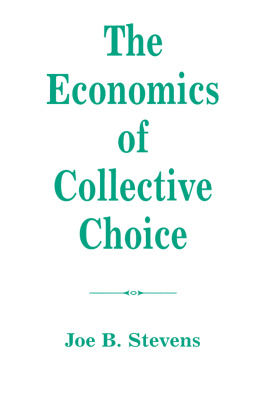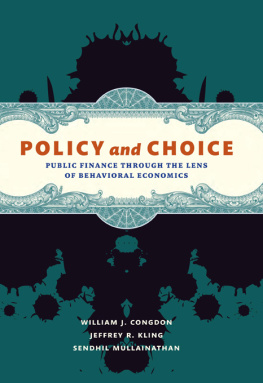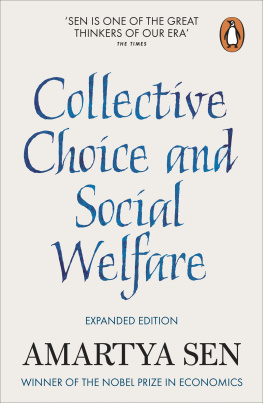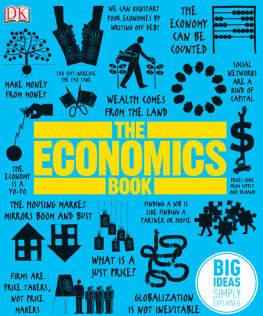The Economics of Collective Choice
First published 1993 by Westview Press
Published 2018 by Routledge
711 Third Avenue, New York, NY 10017, USA
2 Park Square, Milton Park, Abingdon, Oxon OX14 4RN
Routledge is an imprint of the Taylor & Francis Group, an informa business
Copyright 1993 Taylor & Francis
All rights reserved. No part of this book may be reprinted or reproduced or utilised in any form or by any electronic, mechanical, or other means, now known or hereafter invented, including photocopying and recording, or in any information storage or retrieval system, without permission in writing from the publishers.
Notice:
Product or corporate names may be trademarks or registered trademarks, and are used only for identification and explanation without intent to infringe.
Library of Congress Cataloging-in-Publication Data
Stevens, Joe B.
The economics of collective choice / Joe B. Stevens.
p. cm.
Includes bibliographical references and index.
ISBN 0-8133-1566-2ISBN 0-8133-1567-0 (pbk.)
1. Social choice. 2. Economic policy. I. Title.
HB846.8.S74 1993
361.61dc20
92-35195
CIP
ISBN 13: 978-0-8133-1567-6 (pbk)
For Ashlyn and Chris
A provocative book will often give rise to several journal articles, but less often will an article stimulate the writing of a textbook. That is what happened in this case. My grateful thanks to my friend and mentor William C. Mitchell for his Textbook Public Choice: A Review Essay (Public Choice, 1982) and for many subsequent discussions that helped a novice understand the literature and write a text that may help students appreciate the collective choice way of thinking.
I also offer my thanks to Tom Husted, Laura Langbein, and michael Munger for using draft versions of the manuscript in their classes and for providing timely and valuable criticism; Randall Holcombe, Larry Kenny, and Jeffrey Berry for kind words of encouragement; Paul Barkley for teaching me how to write; Jerry Spencer for answering late-night calls and helping me understand the publishing world; and Gene Nelson and Dave Ervin for administrative encouragement.
No one should ever write a book without Bobbie and Ray Glass alongside to do the final typing, formatting, and artwork. I thank them for their patience and their computer skills. Mary Brock, Marianne LeDoux, Claire Renard, Linda Hazlewood, Tjodie Templeton, and Donna Atto also helped prepare the copy, and I appreciate their efforts.
I heartily commend the folks at Westview Press to prospective authors. Spencer Carr, who understood what I was trying to do, passed on his enthusiasm to Marykay Scott, Julie Seko, Shena Redmond, and Ellen Kresky, who helped us put it together. My thanks to all of you.
Teachers who write textbooks know that their studentspast, present, and futureare really the ones who deserve the main thanks: for their questions, scowls, and occasional blank looks, and then, their grateful nods when they see it. May this book expedite that process.
Joe B. Stevens
1
Introduction
Neighbors get together to discuss what they can do about preventing burglaries in their part of town. At the state capitol, the legislature debates a proposal to reduce air pollution. At a nearby convention, manufacturers of electronic equipment discuss a legislative proposal to raise tariffs on imports from Japan. In the countryside, angry farmers debate how to deal with a neighbor who sells his milk as usual instead of dumping it to support their boycott. A voter wonders whether reading the voters pamphlet is worth the time it takes, and indeed, whether voting itself is worth it.
These situations all involve collective choice, and they all involve economics. The purpose of this book is to present a set of economic concepts that allow a better understanding of collective choice situations and to show how much they have in common. Many of the economic concepts have been developed in the past thirty years, but many of the issues are as old as civilization. It might not be difficult to imagine the cave people, all armed with large clubs, and all with strong opinions about who should go out and fight a marauder and who gets to stay in the cave. Our present means of resolving issues may be more sophisticated, but we still worry about marauders and we still debate who should do battle and who gets to stay in the cave.
Economics and collective choice are terms that need to be defined and explained. Economics can be defined, as usual, as the allocation of scarce resources among alternative uses, but collective choice requires more attention because it is probably less familiar to students of economics.
Participants, methods of choice, and criteria for choosing are the key elements of collective choice. Lets deal briefly with each of these.
1.11 Participants
A simplistic view of collective choice is that everyone in a group comes together to decide a matter of common interest. This invites images of community, belonging, and responsibility, but it characterizes only a small part of collective choice. For one thing, participation-or the lack of it-is an outcome of an incentive system. Participation in collective choice is usually voluntary, but unless social pressure, civic pride, or the prospects for gain cause one to participate, voluntary may mean nonparticipatory. You might participate by voting, but your vote is only one of many, and its absence probably wont be noticed. Thus, you may decide not to vote. You can work to elect a candidate to serve in the U.S. Senate, but the election bid may not be successful. You can apply to work for a government agency where you can participate in collective choice by helping to carry out-and maybe bend-legislative enactments.
Voters, senatorial candidates, and government workers arent the only ones who participate in collective choice. Business firms, trade associations, labor unions, nonprofit organizations, and many other interest groups may also participate. There may be many-or few-participants in collective choice. They may be elected, they may be appointed, they may be hired, or they may volunteer to participate. And they may have very different points of view about how to resolve an issue.
1.12 Methods of Choice
The second element of collective choice is the method of making decisions. There are several methods of choice, and more than one is usually used in a particular situation. A dictator might make all major decisions in a very centralized fashion with religion, tradition, or military power as the basis for authority. This extreme method of making decisions doesnt sound very attractive, but even its critics admit that it can save on the use of resources. Serfs and vassals in feudal times had very few rights and civil liberties, but they didnt have to spend much time on matters of collective choice.
At the other end of the spectrum is agreeing collectively to use the market as a decentralized way to make decisions: Individuals choose what they will buy and sell. To a great degree, people make their own decisions about where to live, where to work, what clothes to buy, and where to do the grocery shopping. We collectively decide to allow individual choice to work when we resist centralized control over these types of decisions. Others could, after all, make these decisions for us.













